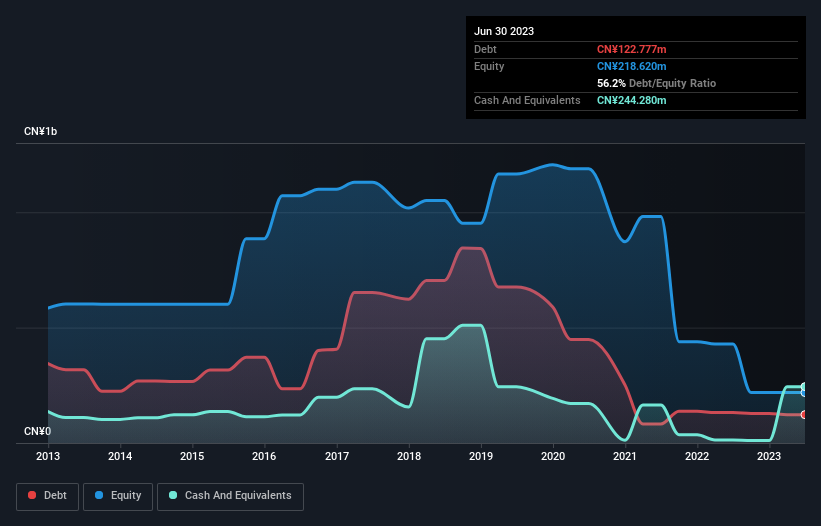Legendary fund manager Li Lu (who Charlie Munger backed) once said, 'The biggest investment risk is not the volatility of prices, but whether you will suffer a permanent loss of capital.' So it seems the smart money knows that debt - which is usually involved in bankruptcies - is a very important factor, when you assess how risky a company is. As with many other companies A Metaverse Company (HKG:1616) makes use of debt. But the more important question is: how much risk is that debt creating?
What Risk Does Debt Bring?
Generally speaking, debt only becomes a real problem when a company can't easily pay it off, either by raising capital or with its own cash flow. In the worst case scenario, a company can go bankrupt if it cannot pay its creditors. However, a more usual (but still expensive) situation is where a company must dilute shareholders at a cheap share price simply to get debt under control. Having said that, the most common situation is where a company manages its debt reasonably well - and to its own advantage. When we examine debt levels, we first consider both cash and debt levels, together.
Check out our latest analysis for A Metaverse
What Is A Metaverse's Debt?
You can click the graphic below for the historical numbers, but it shows that A Metaverse had CN¥122.8m of debt in June 2023, down from CN¥131.9m, one year before. However, it does have CN¥244.3m in cash offsetting this, leading to net cash of CN¥121.5m.

How Strong Is A Metaverse's Balance Sheet?
According to the last reported balance sheet, A Metaverse had liabilities of CN¥293.1m due within 12 months, and liabilities of CN¥14.3m due beyond 12 months. Offsetting this, it had CN¥244.3m in cash and CN¥77.8m in receivables that were due within 12 months. So it actually has CN¥14.7m more liquid assets than total liabilities.
This surplus suggests that A Metaverse has a conservative balance sheet, and could probably eliminate its debt without much difficulty. Simply put, the fact that A Metaverse has more cash than debt is arguably a good indication that it can manage its debt safely. When analysing debt levels, the balance sheet is the obvious place to start. But you can't view debt in total isolation; since A Metaverse will need earnings to service that debt. So when considering debt, it's definitely worth looking at the earnings trend. Click here for an interactive snapshot.
In the last year A Metaverse had a loss before interest and tax, and actually shrunk its revenue by 83%, to CN¥9.0m. To be frank that doesn't bode well.
So How Risky Is A Metaverse?
We have no doubt that loss making companies are, in general, riskier than profitable ones. And in the last year A Metaverse had an earnings before interest and tax (EBIT) loss, truth be told. And over the same period it saw negative free cash outflow of CN¥18m and booked a CN¥208m accounting loss. With only CN¥121.5m on the balance sheet, it would appear that its going to need to raise capital again soon. Even though its balance sheet seems sufficiently liquid, debt always makes us a little nervous if a company doesn't produce free cash flow regularly. There's no doubt that we learn most about debt from the balance sheet. But ultimately, every company can contain risks that exist outside of the balance sheet. We've identified 4 warning signs with A Metaverse (at least 2 which are concerning) , and understanding them should be part of your investment process.
If, after all that, you're more interested in a fast growing company with a rock-solid balance sheet, then check out our list of net cash growth stocks without delay.
New: Manage All Your Stock Portfolios in One Place
We've created the ultimate portfolio companion for stock investors, and it's free.
• Connect an unlimited number of Portfolios and see your total in one currency
• Be alerted to new Warning Signs or Risks via email or mobile
• Track the Fair Value of your stocks
Have feedback on this article? Concerned about the content? Get in touch with us directly. Alternatively, email editorial-team (at) simplywallst.com.
This article by Simply Wall St is general in nature. We provide commentary based on historical data and analyst forecasts only using an unbiased methodology and our articles are not intended to be financial advice. It does not constitute a recommendation to buy or sell any stock, and does not take account of your objectives, or your financial situation. We aim to bring you long-term focused analysis driven by fundamental data. Note that our analysis may not factor in the latest price-sensitive company announcements or qualitative material. Simply Wall St has no position in any stocks mentioned.
About SEHK:1616
A Metaverse
An investment holding company, primarily engages in the media business in the People's Republic of China.
Slight risk with imperfect balance sheet.
Market Insights
Community Narratives




